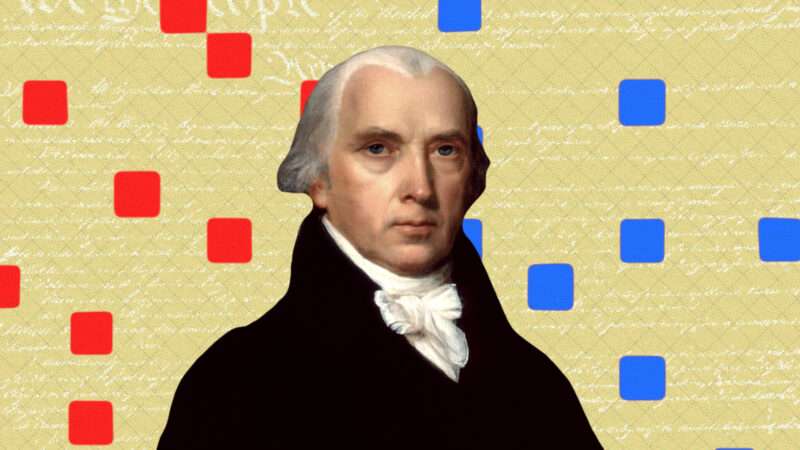
Happy birthday to James Madison, who is, pound-for-pound, the most distinguished Founding Father. A driving force behind the drafting and ratification of the Constitution, Madison shepherded the young, fractious United States from confederacy to republic. And to make explicit the new government's commitments to personal liberty, the Virginian authored the Bill of Rights.
Madison's ideal union was a far cry from the reality of modern American governance. He envisioned a self-sufficient federal—or "general"—government, vested with the powers necessary to conduct foreign policy, mediate interstate conflicts, and perform a grab bag of other tasks. The federal government's powers are few and defined, however, and the Framers intended that everyday governing be left to the statehouses.
In fact, in 1787, when the Constitutional Convention submitted its final product for state ratification, many argued that the proposed Constitution would create a central government capable of tyranny. In response, Madison, Alexander Hamilton, and John Jay penned a series of defenses of the new constitution—The Federalist Papers.
In Federalist No. 39, Madison, writing under the trio's collective pen name, Publius, countered Anti-Federalist charges that the proposed government would be overly centralized and could subsume the powers rightfully exercised by the states. He rejected this, writing that while the federal government would be supreme when exercising its enumerated powers, the state governments are to be "no more subject, within their respective spheres, to the general authority, than the general authority is subject to them, within its own sphere."
Indeed, Madison continued, the federal government's "jurisdiction extends to certain enumerated objects only, and leaves to the several States a residuary and inviolable sovereignty over all other objects." Clearly implied by the original Constitution's text, these sentiments were in 1791 codified as the 10th Amendment, which states that "The powers not delegated to the United States by the Constitution, nor prohibited by it to the States, are reserved to the States respectively, or to the people."
The benefit of a separation of powers between the federal government and state governments is the same as that of a separation of powers between branches of a single government: It constrains the power of feckless majorities over their dissenting brethren. John Adams once wrote, "The only maxim of a free government ought to be to trust no man living with power to endanger the public liberty."
Since 1789, the federal government has assumed massive, all-encompassing powers. Congress, the chief culprit in this overreach, has further delegated vast legislative powers to the executive branch or stood idly by while the latter seized them; and the Supreme Court has largely rubber-stamped these efforts in such cases as NLRB v. Jones & Laughlin Steel (1937) and Wickard v. Filburn (1942)—which wildly expanded Congress' powers under the commerce clause.
Nevertheless, we can still see on Madison's 272nd birthday that his revolutionary contribution to political science and human liberty provides an aspirational guidepost for any large, free, and diverse nation.
The post James Madison's Decentralized Republic appeared first on Reason.com.







